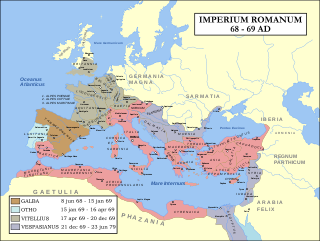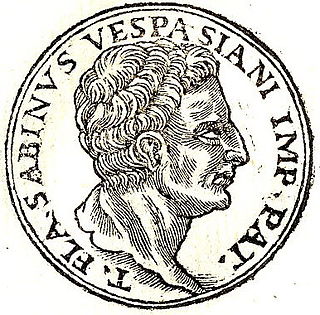
Vespasian was Roman emperor from 69 to 79. The fourth and last in the Year of the Four Emperors, he founded the Flavian dynasty that ruled the Empire for 27 years.

AD 69 (LXIX) was a common year starting on Sunday of the Julian calendar. At the time, it was known as the Year of the Consulship of Augustus and Rufinus. The denomination AD 69 for this year has been used since the early medieval period, when the Anno Domini calendar era became the prevalent method in Europe for naming years.

The gens Petronia was a plebeian family at ancient Rome. This gens claimed an ancient lineage, as a Petronius Sabinus is mentioned in the time of Lucius Tarquinius Superbus, the last of the Roman kings, but few Petronii are mentioned in the time of the Republic. They are frequently encountered under the Empire, holding numerous consulships, and eventually obtaining the Empire itself during the brief reign of Petronius Maximus in AD 455.
Titus Flavius may refer to

The Flavian dynasty was a Roman imperial dynasty, which ruled the Roman Empire between 69 AD and 96 AD, encompassing the reigns of Vespasian (69–79), and his two sons Titus (79–81) and Domitian (81–96). The Flavians rose to power during the civil war of 69, known as the Year of the Four Emperors. After Galba and Otho died in quick succession, Vitellius became emperor in mid 69. His claim to the throne was quickly challenged by legions stationed in the Eastern provinces, who declared their commander Vespasian emperor in his place. The Second Battle of Bedriacum tilted the balance decisively in favour of the Flavian forces, who entered Rome on December 20. The following day, the Roman Senate officially declared Vespasian emperor of the Roman Empire, thus commencing the Flavian dynasty. Although the dynasty proved to be short-lived, several significant historic, economic and military events took place during their reign.

The gens Flavia was a plebeian family at ancient Rome. Its members are first mentioned during the last three centuries of the Republic. The first of the Flavii to achieve prominence was Marcus Flavius, tribune of the plebs in 327 and 323 BC; however, no Flavius attained the consulship until Gaius Flavius Fimbria in 104 BC. The gens became illustrious during the first century AD, when the family of the Flavii Sabini claimed the imperial dignity.
Titus Flavius Petro was the paternal grandfather of the Roman Emperor Vespasian.

Vespasia Polla was the mother of the Roman emperor Vespasian, and grandmother to the emperors Titus and Domitian. Polla came from an equestrian family at Nursia.
Titus Flavius T. f. T. n. Clemens was a cousin of the emperor Domitian, with whom he served as consul from January to April in AD 95. Shortly after leaving the consulship, Clemens was executed, allegedly for atheism, although the exact circumstances remain unclear. Over time, he came to be regarded as an early Christian martyr.

Titus Flavius T. f. Sabinus was a Roman eques and the father of the emperor Vespasian.
Titus Flavius T. f. T. n. Sabinus was a Roman politician and soldier. A native of Reate, he was the elder son of Titus Flavius Sabinus and Vespasia Polla, and brother of the Emperor Vespasian.
Titus Flavius Sabinus was a Roman senator who was active in the first century AD. He was twice consul suffectus, first in the nundinium of April through June of 69 with his brother Gnaeus Arulenus Caelius Sabinus, and again in May and June of 72 as the colleague of Gaius Licinius Mucianus.
See also Titus Flavius Sabinus (disambiguation) for other men of this name.

Arrecina Tertulla was a Roman woman who lived in the 1st century. She came from obscure origins and her family were of Equestrian rank.
The gens Vitellia was a family of ancient Rome, which rose from obscurity in imperial times, and briefly held the Empire itself in AD 69. The first of this gens to obtain the consulship was Aulus Vitellius, uncle of the emperor Vitellius, in AD 32.

The gens Vibia was a plebeian family at ancient Rome. Although individuals named Vibius appear in history during the time of the Second Punic War, no members of this gens are found at Rome until the final century of the Republic. The first of the Vibii to obtain the consulship was Gaius Vibius Pansa in 43 BC, and from then until imperial times the Vibii regularly filled the highest offices of the Roman state. The emperors Trebonianus Gallus and Volusianus each claimed descent from the family.
Sabinus is an ancient Roman cognomen originally meaning "Sabine"; that is, it indicated origin among the Sabines, an ancient people of Latium. It was used by a branch of the gens Flavia, of the gens Calvisia, and several others, and is by far the most common of the cognomina indicating ethnic origin that were in use during the Republican and Augustan eras. Sabine heritage carried a positive stereotype of traditional values and trustworthiness, and since the cognomen may have been appropriated by some politicians for its aura of uprightness, it should not always be taken as a mark of authentic Sabine origin.
The gens Poppaea was a minor plebeian family at Rome. Members of this gens first appear under the early Empire, when two brothers served as consuls in AD 9. The Roman empress Poppaea Sabina was a descendant of this family, but few others achieved any prominence in the Roman state. A number of Poppaei are known from inscriptions. The name is sometimes confused with that of Pompeia.
Gnaeus Arulenus Caelius Sabinus was a Roman senator, who was active during the Year of Four Emperors. He was suffect consul in the nundinium of April through June of 69 as the colleague of his brother Titus Flavius Sabinus.








